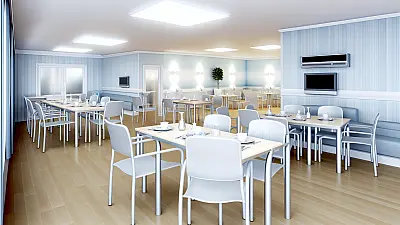NORTH HOLLYWOOD, CA - A recent inspection at Valley Vista Nursing and Transitional Care LLC revealed serious lapses in basic hygiene and infection control protocols, with inspectors documenting unsanitary conditions in resident rooms that posed potential health risks to vulnerable patients.

Unsanitary Living Conditions Documented
The April 4, 2025 inspection uncovered disturbing conditions in the room of a resident with multiple complex medical conditions, including chronic obstructive pulmonary disease, lupus, legal blindness, schizophrenia, and epilepsy. Inspectors found food debris scattered on the floor beside the resident's bed, including a plastic spoon with brown residue, a glass jar containing brown residue, an overturned plate, and orange peels.
Most concerning was the presence of ants both inside the glass jar and crawling on the floor around the resident's bed area. The Certified Nurse Assistant (CNA) present during the inspection acknowledged the unsanitary conditions, stating "it is important to keep Resident 1's room clean to prevent infections."
The resident in question required maximal assistance with daily activities due to moderately impaired cognitive functioning and was completely incontinent of both urine and bowel movements, making proper hygiene protocols even more critical for preventing serious health complications.
Contaminated Medical Equipment Creates Additional Risks
Beyond the food debris, inspectors discovered dried fecal residue on the resident's bedside commode, a piece of essential medical equipment used multiple times daily. The CNA on duty confirmed the contamination, noting "the bedside commode should have been cleaned to prevent spread of infection."
This contamination represents a significant breach of basic infection control measures. Bedside commodes require thorough cleaning and disinfection after each use, particularly for residents who are incontinent and have compromised immune systems due to chronic conditions like lupus.
Medical Implications of Poor Hygiene Standards
The documented conditions create multiple pathways for serious health complications. Food debris and standing organic matter provide breeding grounds for harmful bacteria and attract insects that can transmit pathogens. For residents with chronic respiratory conditions like COPD, exposure to additional bacterial or fungal contaminants can trigger severe exacerbations requiring emergency medical intervention.
Residents with autoimmune conditions such as lupus face even greater risks, as their compromised immune systems struggle to fight off infections that healthy individuals might easily overcome. The combination of incontinence, cognitive impairment, and multiple chronic conditions makes this resident particularly vulnerable to urinary tract infections, skin breakdown, and systemic infections that could prove life-threatening.
The presence of fecal contamination on medical equipment creates direct pathways for bacterial transmission, potentially leading to serious gastrointestinal infections, antibiotic-resistant bacterial colonization, and sepsis in vulnerable populations.
Facility Leadership Acknowledges Systemic Failures
During the inspection, facility leadership acknowledged the severity of the violations. The MDS Coordinator, who was covering for the Infection Preventionist, stated the facility "failed to keep Resident 1's room clean and sanitary which could potentially jeopardize Resident 1's health by causing infection."
The Director of Nursing confirmed that "resident rooms should be kept clean and sanitary" and admitted the facility "failed to keep Resident 1's room clean, provide homelike environment, and maintain infection control measures which could potentially become a hazard to Resident 1's health."
Industry Standards and Required Protocols
Federal regulations require nursing homes to maintain infection control programs that include proper cleaning and disinfection of resident-care equipment and living spaces. The facility's own policy, reviewed in January 2025, specifically mandates that resident-care equipment be cleaned and disinfected according to current CDC recommendations and OSHA Bloodborne Pathogens Standard.
Proper protocols require immediate removal of food debris, thorough cleaning of surfaces with appropriate disinfectants, and complete sanitization of medical equipment after each use. Semi-critical items that may contact mucous membranes or non-intact skin must be free from all microorganisms to prevent transmission of infectious diseases.
Additional Issues Identified
The inspection also revealed concerns about the facility's ability to provide appropriate care coordination for residents with complex medical needs, particularly those requiring assistance with basic activities of daily living and those with cognitive impairments who cannot advocate for themselves.
The documented violations represent a pattern of inadequate oversight of basic care standards, raising questions about staff training, supervisory protocols, and quality assurance measures throughout the facility.
These inspection findings highlight the critical importance of consistent infection control measures in long-term care settings, where residents with multiple chronic conditions depend entirely on staff to maintain safe, sanitary living environments that protect their health and dignity.
Full Inspection Report
The details above represent a summary of key findings. View the complete inspection report for Valley Vista Nursing and Transitional Care LLC from 2025-04-04 including all violations, facility responses, and corrective action plans.
💬 Join the Discussion
Comments are moderated. Please keep discussions respectful and relevant to nursing home care quality.